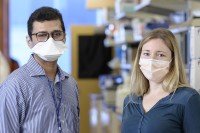Finding

Repairing DNA Damage in Cancer Cells
New findings could lead to a different kind of cancer drug that targets a DNA damage repair pathway called nucleotide excision repair.
In the Clinic

Innovative Research Center Will Explore Hereditary Cancer Genes
MSK’s new Robert and Kate Niehaus Center for Inherited Cancer Genomics is using the latest in gene sequencing technologies to discover the inherited causes of cancer.
In the Lab

Gene Mutation Linked to Inherited Risk of Common Form of Childhood Leukemia
Researchers have found the first evidence that susceptibility to developing acute lymphoblastic leukemia during childhood may be heritable.
Honors

Three Memorial-Sloan Kettering Researchers Receive Special Awards by the American Society of Clinical Oncology
Charles Sawyers, Larry Norton, and Kenneth Offit are being honored with special awards at the annual meeting of the world’s leading professional organization for cancer physicians and researchers.
Finding

New Findings May Lead to Better Predictions of Breast Cancer Risk in Women with Inherited Mutations
A study identifies genetic variations that alter the risk of breast cancer in women who have a certain gene mutation.
Media Advisory

Genetic Variants May Affect the Risk of Breast Cancer in Women with BRCA2 Mutations
An international study led by researchers at Memorial Sloan Kettering Cancer Center has identified genetic variants in women with <i>BRCA2</i> mutations that may increase or decrease their risk of developing breast cancer.

Researchers Identify New Genetic Marker for Breast Cancer
An international group of investigators led by scientists at Memorial Sloan Kettering Cancer Center and the National Cancer Institute has identified a new genetic marker of risk for breast cancer. Women with this DNA variation are at a 1.4 times greater risk of developing breast cancer compared to those without the variation.







